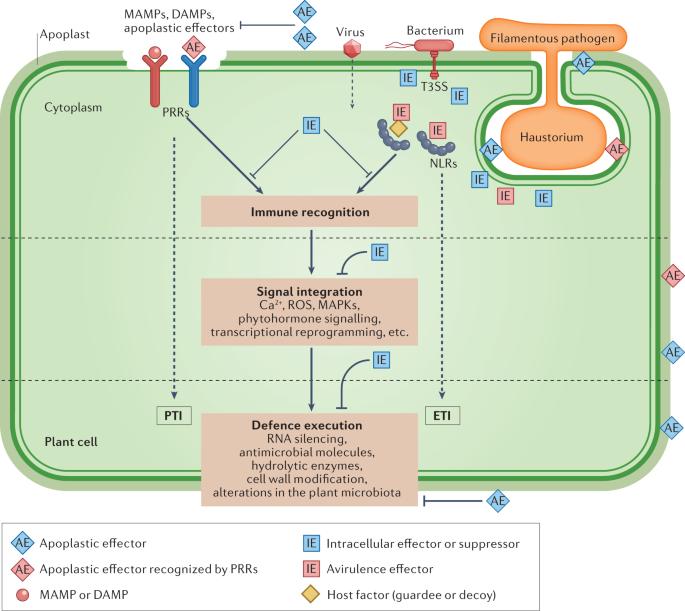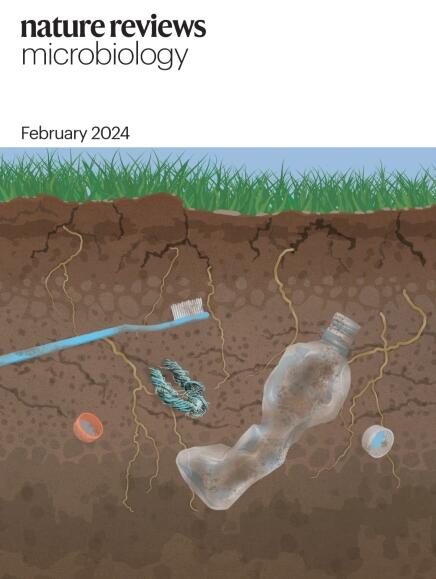微生物病原体逃避植物免疫
IF 69.2
1区 生物学
Q1 MICROBIOLOGY
引用次数: 73
摘要
植物致病病毒、细菌、真菌和卵菌会在自然栖息地和农业环境中造成破坏性疾病,从而威胁植物的生物多样性和全球粮食安全。植物感知和应对微生物感染的能力决定了植物与微生物相互作用的结果。与宿主相适应的微生物病原体利用各种感染策略来逃避或对抗植物的免疫力,并最终建立起一个复制生态位。通过抑制宿主识别或随后的免疫信号和防御执行来逃避植物免疫是不同微生物病原体用来致病的重要感染策略,是有效利用宿主遗传抗性基因进行可持续病害控制的重大障碍。在本综述中,我们将讨论微生物病原体为成功感染植物而规避复杂植物免疫网络的各种策略的现有知识。此外,我们还讨论了如何利用这些知识来设计作物抗性。在这篇综述中,Wang 及其同事回顾了微生物病原体用来逃避植物免疫以成功感染的策略。他们强调了微生物效应物如何操纵涉及免疫感应、信号整合和防御执行的宿主细胞过程,以及如何利用这些知识来设计作物抗性。本文章由计算机程序翻译,如有差异,请以英文原文为准。

Evasion of plant immunity by microbial pathogens
Plant pathogenic viruses, bacteria, fungi and oomycetes cause destructive diseases in natural habitats and agricultural settings, thereby threatening plant biodiversity and global food security. The capability of plants to sense and respond to microbial infection determines the outcome of plant–microorganism interactions. Host-adapted microbial pathogens exploit various infection strategies to evade or counter plant immunity and eventually establish a replicative niche. Evasion of plant immunity through dampening host recognition or the subsequent immune signalling and defence execution is a crucial infection strategy used by different microbial pathogens to cause diseases, underpinning a substantial obstacle for efficient deployment of host genetic resistance genes for sustainable disease control. In this Review, we discuss current knowledge of the varied strategies microbial pathogens use to evade the complicated network of plant immunity for successful infection. In addition, we discuss how to exploit this knowledge to engineer crop resistance. In this Review, Wang and colleagues review the strategies microbial pathogens use to evade plant immunity for successful infection. They highlight how microbial effectors manipulate host cellular processes involved in immune sensing, signal integration and defence execution and how to exploit this knowledge to engineer crop resistance.
求助全文
通过发布文献求助,成功后即可免费获取论文全文。
去求助
来源期刊

Nature Reviews Microbiology
生物-微生物学
CiteScore
74.00
自引率
0.50%
发文量
149
审稿时长
6-12 weeks
期刊介绍:
At Nature Reviews Microbiology, our goal is to become the leading source of reviews and commentaries for the scientific community we cater to. We are dedicated to publishing articles that are not only authoritative but also easily accessible, supplementing them with clear and concise figures, tables, and other visual aids. Our objective is to offer an unparalleled service to authors, referees, and readers, and we continuously strive to maximize the usefulness and impact of each article we publish. With a focus on Reviews, Perspectives, and Comments spanning the entire field of microbiology, our wide scope ensures that the work we feature reaches the widest possible audience.
 求助内容:
求助内容: 应助结果提醒方式:
应助结果提醒方式:


